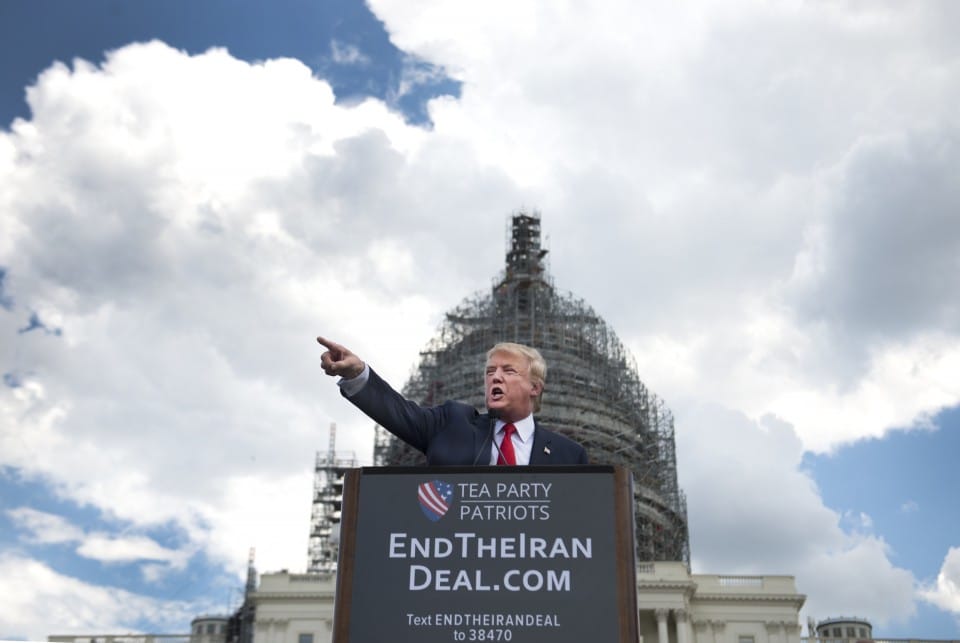Graham Allison, the former director of Harvard’s Belfer Center for Science and International Affairs, is the Douglas Dillon Professor of Government at Harvard Kennedy School.
President Trump is expected to announce today or tomorrow that he is taking the first step to bury the Iran nuclear deal. That 2015 agreement pushed Iran’s nuclear program back from a few months away from a bomb to over a year. By “decertifying” the deal, Trump will hand the ball to Congress, inviting it to reimpose sanctions on Iran. That would mean, in effect, unilateral American withdrawal from the agreement, freeing Iran from its current constraints and allowing it to resume its quest for a bomb.
For all its flaws, the nuclear agreement is the one major hurdle preventing Iran from becoming a second North Korea — a rogue state with nuclear weapons. Before acting, Trump should talk directly to those who have the most to lose: the leaders of Israel’s national security establishment who put their own and their colleagues’ lives on the line every day. If he does, he will discover that a vast majority believe that decertification will endanger America’s greatest friend and ally in the Middle East. As former Israeli prime minister and noted Iran hawk Ehud Barak recently said, this would be a “mistake” that would “serve the Iranians.”
Even many of the agreement’s most severe critics acknowledge that it imposed on Iran the most intrusive verification and inspection regime ever negotiated. Thanks to these provisions, U.S. and Israeli intelligence officers have high confidence that we would discover any serious effort to cheat. It has also provided the U.S. and its allies with valuable information about targets that would be destroyed by military attacks if Iran were to attempt to violate the agreed constraints and dash toward a bomb.
Trump’s senior national security advisers have counseled him against taking a step they know will seriously harm American national security. Last week, Sen. Angus King (I-Maine) asked Secretary of Defense Jim Mattis whether staying in the agreement served American national security interests. Mattis responded unambiguously and succinctly: “Yes.” Later in the week, Senate Democrats pleaded with Trump’s national security adviser H.R. McMaster to prevent decertification. A well-known Iran hawk, McMaster reportedly said he was not the one they had to convince.
Prior to the agreement, no country had been more alarmed by Iran’s relentless march toward a nuclear bomb than Israel. Leaders of the Israeli military and intelligence community have reflected on the fact that an Iranian nuclear attack on Israel would be devastating.
The bottom line was captured by Amos Yadlin, the legendary former head of the Israel Defense Forces’ Directorate of Military Intelligence. He is normally hesitant about offering advice to American presidents, but he nonetheless implored the president and Israeli Prime Minister Benjamin Netanyahu to “listen to the security establishments in both countries that caution that such a strategy [killing the agreement] could have serious drawbacks.” Last month, while Netanyahu was en route to the United Nations General Assembly to declare “fix it, or nix it,” a leading Israeli newspaper reminded everyone that Bibi’s position is “at odds with most Israeli experts in Military Intelligence and in the IDF’s Planning Directorate, the Mossad, Foreign Ministry and the Atomic Energy Committee.”
The leading advocate of decertification in Congress has been Sen. Tom Cotton (R-Ark.). Last week, he said at the Council on Foreign Relations, “The strongest indictment of the deal is that it expires.” While he is correct about the fact that restrictions on Iran’s nuclear activities will be phased out over 10-15 years, to paraphrase the former chief of Mossad, Efraim Halevy: Is that a sound reason to cause the deal to expire today? Even Netanyahu’s former national security adviser, Uzi Arad, recently spoke out publicly against withdrawal, noting: “Agreements should not be renegotiated; they should be strengthened, and that has been done with previous arms-control agreements throughout history.”
Other critics point to Iran’s continuing ballistic and cruise missile programs that also pose serious threats to Israel. But as Halevy noted, the nuclear agreement was always meant to deal exclusively with Iran’s nuclear program. However dangerous Iran’s missiles may be, if they were carrying nuclear warheads, the threat would be a thousand times worse. Barak also commented on this critique, explicitly saying that decertification would not help the U.S. curb Iran’s ballistic missile program.
There are many reasons to be concerned about the nuclear agreement. There is no reason, however, to decertify or withdraw from a deal that makes us and our allies safer. The chief of Israel’s military, Gadi Eizenkot, wakes up every morning thinking about the array of threats Israel faces in the short, medium and long term. Eizenkot put it bluntly when he presented Israel’s first-ever public defense strategy only a few days after the agreement was implemented: “Without a doubt, the nuclear deal between Iran and the West is a historic turning point. In the 15-year timeframe we are looking towards, we are still keeping Iran high on our priority lists because we need to monitor its nuclear program. But this is a real change. This is a strategic turning point.”
Before jeopardizing Israel’s national security, Trump, members of Congress and all other Americans who care about Israel’s survival should listen carefully to the security professionals who stand on Israel’s front line.
This was produced by The WorldPost, a partnership of the Berggruen Institute and The Washington Post.





